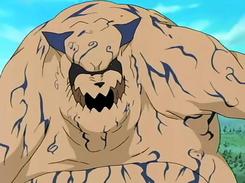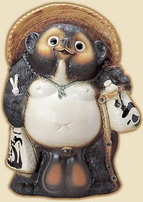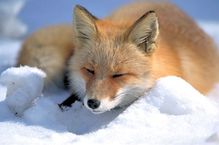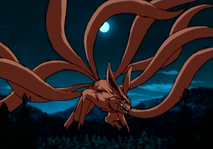FANTASTICAL CREATURES
Yokai
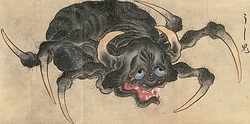
A yokai with a resemblance to a spider
Yokai are a kind of supernatural creatures that exist in Japanese folklore. The word 'yokai' means 'otherworldly' or 'weird' in English, which is a very accurate description of most known yokai. Some yokai resemble indigenous animals of Japan and are believed to be shape-shifters with the ability to turn into a human. Others are humanoid in appearance, with only a few characteristics that set that apart as unnatural.
Tengu
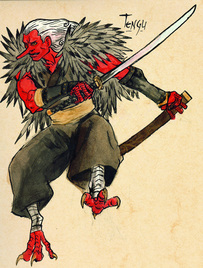
A common representation of tengu
Tengu, or "heavenly dogs" as translated into English, take their name from the dog-like tiangou demons in Chinese folklore, but in reality, do not resemble dogs at all. Instead, they are said to be anthropomorphic in shape with avian-like features. Often taking the form of birds of prey, their clawed feet resemble talons and their long noses are like beaks, which is considered their most defining characteristic.
In most folktales, tengus are portrayed as ridiculous creatures, easily confused and mislead by the humans that they encounter. For example, in the popular tale "The Tengu's Magic Cloak", a young boy manages to dupe a tengu into trading its magical straw cloak, capable of rendering the wearer invisible, for an ordinary piece of bamboo.
Another tale, "The Tengu's Gourd", tells of gambler who also manages to outwit a tengu. A tengu and the gambler meet one day and the tengu asks him what he is most afraid of. The gambler lies and says he is afraid of gold and mochi (rice cakes). The tengu replies by answering truthfully that he is frightened of a kind of plant. The tengu, thinking himself clever by intending to scare the gambler, then causes it to rain money and mochi. The gambler who in reality is not afraid of such things at all, is of course extremely happy. He then proceeds to scare away the tengu with the thing it is most frightened of and manages to keep all the gold and mochi for himself.
In most folktales, tengus are portrayed as ridiculous creatures, easily confused and mislead by the humans that they encounter. For example, in the popular tale "The Tengu's Magic Cloak", a young boy manages to dupe a tengu into trading its magical straw cloak, capable of rendering the wearer invisible, for an ordinary piece of bamboo.
Another tale, "The Tengu's Gourd", tells of gambler who also manages to outwit a tengu. A tengu and the gambler meet one day and the tengu asks him what he is most afraid of. The gambler lies and says he is afraid of gold and mochi (rice cakes). The tengu replies by answering truthfully that he is frightened of a kind of plant. The tengu, thinking himself clever by intending to scare the gambler, then causes it to rain money and mochi. The gambler who in reality is not afraid of such things at all, is of course extremely happy. He then proceeds to scare away the tengu with the thing it is most frightened of and manages to keep all the gold and mochi for himself.
Kappa
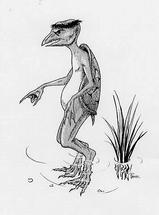
Illustration of a kappa
A kappa or 'river child', is a type of water sprite--very similar to the naiads and kelpies of Greek and Scottish myths. Salamander-like in appearance, kappas have scaly, reptilian skin, and webbed fingers and feet, which allows them to live and move in the water. As a result, kappas inhabit ponds, rivers, and other fresh-water sources.
Typically regarded as troublemakers, kappas are usually blamed for drownings that occur in coastal areas of Japan. They are said to have an appetite for human flesh, and as such, many folktales tell of kappas that kidnap and drown children. However, despite their sometimes malevolent nature, kappas are not considered as being definitively evil. Rather, kappas have typically been used in stories with the explicit purpose of scaring children and warning them of the dangers of the water.
Typically regarded as troublemakers, kappas are usually blamed for drownings that occur in coastal areas of Japan. They are said to have an appetite for human flesh, and as such, many folktales tell of kappas that kidnap and drown children. However, despite their sometimes malevolent nature, kappas are not considered as being definitively evil. Rather, kappas have typically been used in stories with the explicit purpose of scaring children and warning them of the dangers of the water.
Oni
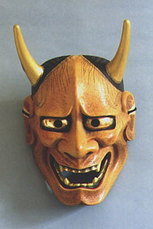
A hannya mask
A subsection of yokai, oni are supernatural creatures that encompass any kind of being similar to that of a demon, ogre, devil, or troll. Oni are typically portrayed as hideous monsters, equipped with claws, fangs, horns, and wild hair. This does not mean however, that they are evil. Because of their abundance of spiritual power, oni are considered ambivalent beings, capable of both good and evil, and as such, are objects of hate and worship. In the Nihongi, it mentions that in the past, peaches were typically used in the practice of warding off oni, due to the peach's magical properties which allow it to control spirits.
Of the various types of oni that exist in Japanese folklore, some are believed to be the spirits of people who carried resentments or malice during their lifetime. Of these, it is thought that hannya (female demons) are the ghosts of women that were consumed by jealousy or obsession in their past lives.
Of the various types of oni that exist in Japanese folklore, some are believed to be the spirits of people who carried resentments or malice during their lifetime. Of these, it is thought that hannya (female demons) are the ghosts of women that were consumed by jealousy or obsession in their past lives.

